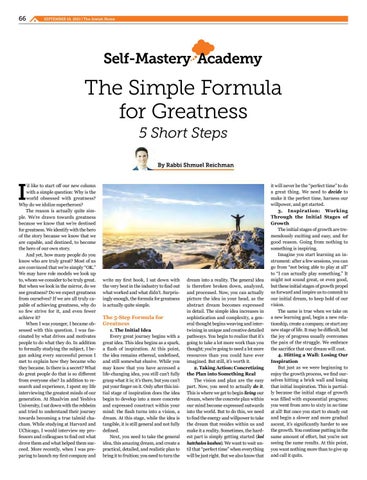66
SEPTEMBER 10, 2021 | The Jewish Home
18
OCTOBER 29, 2015 | The Jewish Home
Self-Mastery Academy
The Simple Formula for Greatness 5 Short Steps By Rabbi Shmuel Reichman
I
’d like to start off our new column with a simple question: Why is the world obsessed with greatness? Why do we idolize superheroes? The reason is actually quite simple. We’re drawn towards greatness because we know that we’re destined for greatness. We identify with the hero of the story because we know that we are capable, and destined, to become the hero of our own story. And yet, how many people do you know who are truly great? Most of us are convinced that we’re simply “OK.” We may have role models we look up to, whom we consider to be truly great. But when we look in the mirror, do we see greatness? Do we expect greatness from ourselves? If we are all truly capable of achieving greatness, why do so few strive for it, and even fewer achieve it? When I was younger, I became obsessed with this question. I was fascinated by what drives and motivates people to do what they do. In addition to formally studying the subject, I began asking every successful person I met to explain how they became who they became. Is there is a secret? What do great people do that is so different from everyone else? In addition to research and experience, I spent my life interviewing the greatest minds of our generation. At Shaalvim and Yeshiva University, I sat down with the rebbeim and tried to understand their journey towards becoming a true talmid chacham. While studying at Harvard and UChicago, I would interview my professors and colleagues to find out what drove them and what helped them succeed. More recently, when I was preparing to launch my first company and
write my first book, I sat down with the very best in the industry to find out what worked and what didn’t. Surprisingly enough, the formula for greatness is actually quite simple.
The 5-Step Formula for Greatness 1. The Initial Idea Every great journey begins with a great idea. This idea begins as a spark, a flash of inspiration. At this point, the idea remains ethereal, undefined, and still somewhat elusive. While you may know that you have accessed a life-changing idea, you still can’t fully grasp what it is; it’s there, but you can’t put your finger on it. Only after this initial stage of inspiration does the idea begin to develop into a more concrete and expressed construct within your mind: the flash turns into a vision, a dream. At this stage, while the idea is tangible, it is still general and not fully defined. Next, you need to take the general idea, this amazing dream, and create a practical, detailed, and realistic plan to bring it to fruition; you need to turn the
dream into a reality. The general idea is therefore broken down, analyzed, and processed. Now, you can actually picture the idea in your head, as the abstract dream becomes expressed in detail. The simple idea increases in sophistication and complexity, a general thought begins weaving and intertwining in unique and creative detailed pathways. You begin to realize that it’s going to take a lot more work than you thought; you’re going to need a lot more resources than you could have ever imagined. But still, it’s worth it. 2. Taking Action: Concretizing the Plan into Something Real The vision and plan are the easy part. Now, you need to actually do it. This is where we get to begin living our dream, where the concrete plan within our mind become expressed outwards into the world. But to do this, we need to find the energy and willpower to take the dream that resides within us and make it a reality. Sometimes, the hardest part is simply getting started (kol hatchalos kashos). We want to wait until that “perfect time” when everything will be just right. But we also know that
it will never be the “perfect time” to do a great thing. We need to decide to make it the perfect time, harness our willpower, and get started. 3. Inspiration: Working Through the Initial Stages of Growth The initial stages of growth are tremendously exciting and easy, and for good reason. Going from nothing to something is inspiring. Imagine you start learning an instrument: after a few sessions, you can go from “not being able to play at all” to “I can actually play something.” It might not sound great, or even good, but these initial stages of growth propel us forward and inspire us to commit to our initial dream, to keep hold of our vision. The same is true when we take on a new learning goal, begin a new relationship, create a company, or start any new stage of life. It may be difficult, but the joy of progress usually overcomes the pain of the struggle. We embrace the sacrifice that our dream will cost. 4. Hitting a Wall: Losing Our Inspiration But just as we were beginning to enjoy the growth process, we find ourselves hitting a brick wall and losing that initial inspiration. This is partially because the initial stage of growth was filled with exponential progress; you went from zero to sixty in no time at all! But once you start to steady out and begin a slower and more gradual ascent, it’s significantly harder to see the growth. You continue putting in the same amount of effort, but you’re not seeing the same results. At this point, you want nothing more than to give up and call it quits.





















